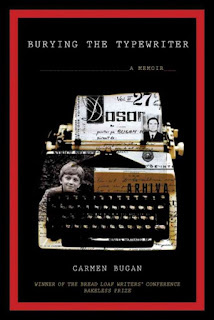.jpeg) Librarians like to classify, and I am struggling to label Burying the Typewriter: A Memoir by Carmen Bugan. Obviously it is a memoir, and it is easy to identify it as a childhood memoir and somewhat of a coming of age memoir. I think it is more than either of these. It is similar to a Holocaust memoir, in that Bugan tells about how her family survived a time of great danger, but it is not set during the Holocaust. Instead, she tells of life during the waining years of communism in Romania. Iron Curtain memoir doesn't sound bad - better than totalitarian state memoir.
Librarians like to classify, and I am struggling to label Burying the Typewriter: A Memoir by Carmen Bugan. Obviously it is a memoir, and it is easy to identify it as a childhood memoir and somewhat of a coming of age memoir. I think it is more than either of these. It is similar to a Holocaust memoir, in that Bugan tells about how her family survived a time of great danger, but it is not set during the Holocaust. Instead, she tells of life during the waining years of communism in Romania. Iron Curtain memoir doesn't sound bad - better than totalitarian state memoir.I know I would group it with First They Killed My Father by Loung Ung and Egg on Mao by Denise Chong, but neither of these were behind the Iron Curtain and second is not even a memoir. How about a description instead? Burying the Typewriter is an intimate account of surviving in an unjust society while actively trying to reform it. The effort to inspire the people to rise up against the oppression is a big part of the story. Bugan's father spends much of his life in Romania in prison for distributing anti-regime newsletters and openly protesting, thinking that his example would encourage others. Instead, they disowned him as friend and helped the secret police spy on Bugan's family.
Of course, it was Bugan's parents, not Bugan, who were demonstrating and conspiring against the Ceasescue regime. She hoped her father would behave himself so they would be left alone and could live a normal life. She prayed the typewriter would not be found. Bugan was, however, the member of the family who dashed past Romania police to enter the American Embassy to apply for asylum. Bugan recounts the time of her childhood with passion and understanding.
Burying the Typewriter is a great addition to a literary genre that I am having trouble naming.
Bugan, Carmen. Burying the Typewriter: A Memoir. Graywolf Press, 2012. ISBN 9781555976170.



No comments:
Post a Comment